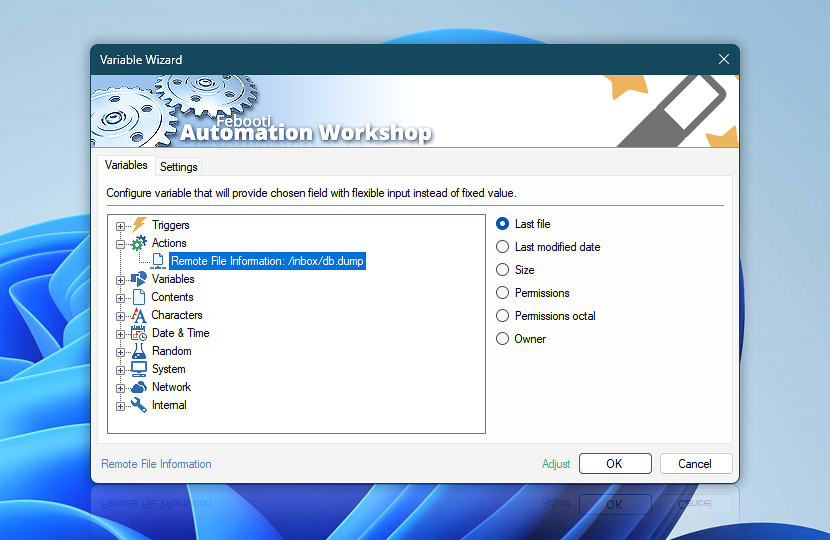The Remote File Information Action retrieves information on a file in a remote directory.
After the Remote File Information Action is completed, the information on its operations is temporarily stored in dynamic variables that can be retrieved by any other Action within the same Task via Variable Wizard.
For example, these variables can be saved as text by Write to File Action, emailed to admin by Send Email Action or used as dynamic parameters in other Actions.
| Variable | Details |
|---|---|
| Last file | Returns the full path and name of file whose information has been retrieved.
Examples:
|
| Last modified date | Returns file's last modified date.
Examples:
|
| Size | Returns file size in bytes.
Examples:
|
| Permissions | Returns file permissions in symbolic notation, e.g., drwxr-xr-x where each letter refers to read, write or execute permissions. For directories the first letter always is d, and for files it is always - dash.
Examples:
|
| Permissions octal | Available only for FTP and SFTP connections when the server is running on a Linux-like operating system. Returns file permissions in Unix octal format, e.g., 755, 600 where each digit refers to a combination of permission bits.
Examples:
|
| Owner | Available only for SFTP connections. Returns owner and group numberic notation.
Examples:
|
| Completion status | Retrieve Action execution status with a possible value—Successful or Failed. Or Empty, if Action has not been executed yet. |
| Adjust* | Streamline creation of Task workflows even further—instantly make quick variable adjustments such as in-place text replacement (all, first, or last), ensuring (starts, ends, or does not), trimming (whitespaces, quotes, etc.), or changing capitalization. Chain multiple adjustments. Optionally, set a different display name. |
Notes
- Most FTP servers can return different (local or UTC) timestamps of file.
- Regular FTP servers report
00seconds for folders. - Folders on Amazon S3 servers does not return timestamp.
- Google Cloud Storage and DigitalOcean Spaces transfer protocols do not support modification timestamps for directories.
- The FTP, Amazon S3, Google Cloud Storage, DigitalOcean Spaces, and WebDAV server permissions usually contain only the first letter of symbolic notation. The SFTP servers usually have all blocks of permissions, e.g.,
-rw-r--r--that translates to—an owner has a read/write access, while the group and world users have only read-only permissions.
Ask for more…
If you have any questions, please do not hesitate to contact our support team.

